Electrobraid stands alone as a permanent perimeter fence; or, keeps horses away from board or wire mesh fence; or, combines with vinyl or pipe
Electrobraid™ does it all!
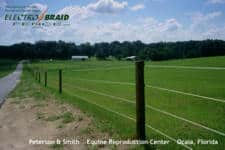
WOOD POSTS

BOARD PROTECTOR FOR ALL TYPES OF FENCE
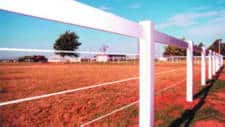
IN COMBINATION WITH VINYL
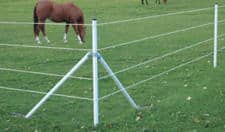
100% PORTABLE WITH MULE™ FIBERGLASS POSTS
And Vinyl Fence:
In combination with vinyl fence
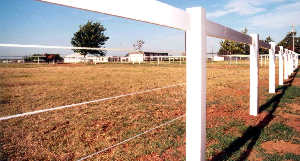
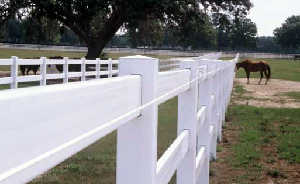
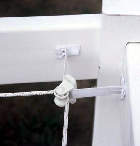
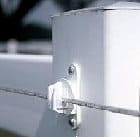
Black Braid™ for Black Board Fence or Deer Exclusion:
In combination with black board fence
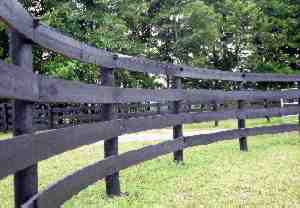
Protect your investment. Stop horses from cribbing and rubbing on your expensive board fence with Black Electrobraid™ as a board protector.
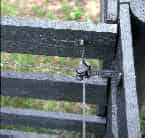
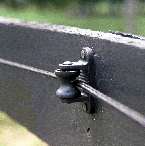
Black Braid™ also makes an excellent deer exclusion fence for sub-urban gardens without the unsightly look of fencing!
Standard Energizer Horse Fence Wiring
Negative (“Grounded”) Positive (“Hot”)
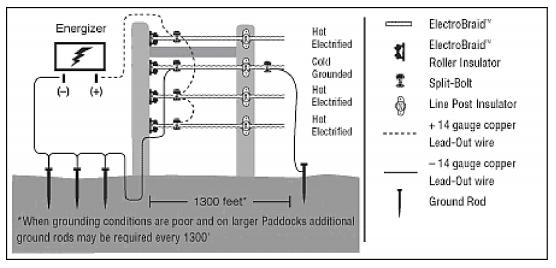
Wiring the Energizer for Areas of High Snowfall
Negative (“Grounded”) Positive (“Hot”)
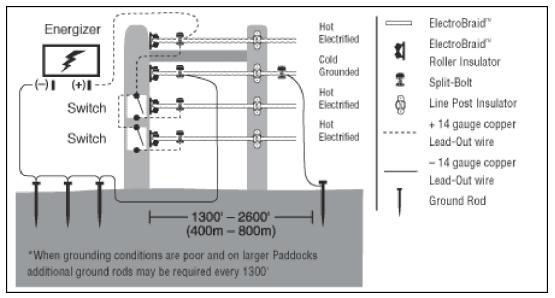
NOTE:
- Switches should be set above snow height.
- Wires should be fastened to post to protect them from damage.
Heavy wet snow can short electric fencing. To prevent this, fences in areas prone to snow accumulation can be wired as illustrated.
Cut-Off switches can be installed to allow you to progressively turn on and off the bottom Standard Energizer Fence Wiring Diagram strands with the changing depth of snow. Wire your energizer as shown in the diagram.
Recommended Line Spacing
With ElectroBraid™ fence you are building the equivalent of a “boxing ring”. The corner and end posts must be strong enough to withstand the forces that would be transmitted if a horse were to strike the fence at speed.
We suggest setting your top strand at withers height (or at least shoulder height) of your tallest horse and the bottom strand somewhere between hock and fetlock based on your specific needs or preference. You should then install the balance of the strands by spacing them equally.
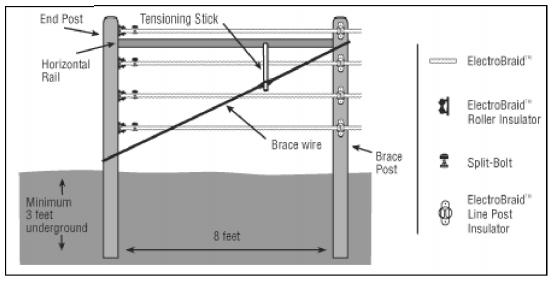
To keep your horses safe, use good horse sense:
-
Know your horses and recognize the limitations of your property.
-
Don’t turn off your fence energizer to save electricity. The cost of electricity for a fence energizer is the same as a 100-watt light bulb – about a dollar a month.
-
Regularly inspect your fence to ensure the Braid™ is taut and properly electrified.
-
Take particular care to make sure your fence is well grounded. 95% of all electric fence problems are due to poor grounding. Check your installation manual or our website, or call us for advice.
-
Use a hot-cold system – – ground the second-from-the-top-strand of Braid™.
-
Separate stallions from other horses. Use a laneway if needed.
-
Small paddocks can be hazardous to very active horses.To fence small paddocks and pens, consider using an ElectroBraid™ Top Line with a heavy grade of Diamond Mesh, V-Mesh or a heavy grade 2-by-4 No-Climb.
-
Provide a sandy area for horses to roll if your horses are inclined to roll close to your fence.
-
Always introduce a horse to a new pasture. For your own safety, turn OFF the fence energizer so the horse you are leading won’t get accidentally shocked and bolt. Lead the horse around the fence perimeter. Once the horse understands the boundaries of its new pasture, release the horse and turn the energizer back on.
-
Take particular care when you introduce a new horse to a pasture where other horses have an established pecking order.
-
Don’t torment your horses with accidental electric shocks by putting water troughs close to your electric fence, hanging grain pails on your fence posts, or throwing hay near your electric fence.
-
Install your ElectroBraid™ fence as recommended with 3 or more strands of Braid™.
-
ElectroBraid™ is engineered for your horses’ safety. Don’t take shortcuts!
-
Please manage your horses with care and maintain your fences. Courts hold the property owner responsible for the security of their animals.
